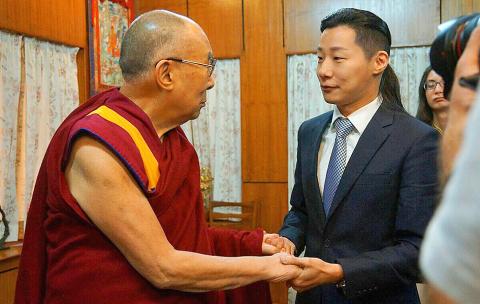The Legislative Yuan will always welcome people from any country if they are willing to help spread democracy and freedom, Legislative Speaker Su Jia-chyuan (蘇嘉全) said yesterday in response to reports that the Dalai Lama was enthusiastic about a possible return to Taiwan.
“The Legislative Yuan very much welcomes those who facilitate the promotion of democracy and freedom,” Su said when asked about a lawmaker’s invitation to the exiled Tibetan spiritual leader to visit Taiwan and speak at the legislature.
The Dalai Lama on Monday said he would be glad to visit Taiwan again after New Power Party (NPP) Legislator Freddy Lim (林昶佐) asked him during a trip to India to speak at the Legislative Yuan.

Photo: Yang Heng-hui, Taipei Times
Lim said that peace can only be achieved if people from different countries are willing to work together.
According to Democratic Progressive Party (DPP) Legislator Kolas Yotaka, who also visited the Dalai Lama, the Tibetan government-in-exile’s prime minister, Lobsang Sangay, said that many Taiwanese Buddhist groups had tried to arrange for the Dalai Lama to visit Taiwan, but the administration of former president Ma Ying-jeou (馬英九) refused to issue him a visa.
We hope that with a consensus from both sides and at an appropriate time, the Dalai Lama will be allowed to visit Taiwan, Sangay said.
The Dalai Lama supported President Tsai Ing-wen’s (蔡英文) public apology to Aborigines on Aug. 1, saying that people should seek to resolve conflict and avoid extremist or radical criticism, Yotaka said, adding that criticism would not solve issues and would prevent true settlement.
Yotaka wrote on Facebook that the Dalai Lama said the apology was “very good.”
“I think in many parts of the world, the stronger nation, when they come, they simply ignore the feelings of native people,” the Facebook post said.
“Now that is eventually changing worldwide, I think; the recognition of native people’s rights. So I think with that kind of world trend... I think Australian government also expressed something similar... Canada as well. So Taiwan also. I think [it is a] very good trend, I think. Good trend,” it said.
The Dalai Lama was concerned over the rights of residency of Tibetans-in-exile in Taiwan and openly praised the Tsai administration’s proposal to abolish the Mongolian and Tibetan Affairs Commission, Yotaka said.
The commission symbolizes Chinese authority on Tibetans and has proved to be a long-term roadblock in communication between Taiwan and the Tibetan government-in-exile, Sangay said, adding that the Tibetan government-in-exile has high expectations of the Tsai administration.
Meanwhile, Lim said he would be founding a group for Tibet in the Legislative Yuan so Taiwan would be able to speak up for oppressed people on the international stage.
The government has remained silent in recent years, despite Chinese oppression of human rights, Lim said. Now that the younger generation is on the rise, it is a key moment for Taiwan to start reinforcing its presence within the international human-rights community, he said.
It is a key moment to boost ties with the Tibetan society, he added.
Additional reporting by CNA

Taiwan is to commence mass production of the Tien Kung (天弓, “Sky Bow”) III, IV and V missiles by the second quarter of this year if the legislature approves the government’s NT$1.25 trillion (US$39.78 billion) special defense budget, an official said yesterday. Commenting on condition of anonymity, a defense official with knowledge of the matter said that the advanced systems are expected to provide crucial capabilities against ballistic and cruise missiles for the proposed “T-Dome,” an advanced, multi-layered air defense network. The Tien Kung III is an air defense missile with a maximum interception altitude of 35km. The Tien Kung IV and V

The disruption of 941 flights in and out of Taiwan due to China’s large-scale military exercises was no accident, but rather the result of a “quasi-blockade” used to simulate creating the air and sea routes needed for an amphibious landing, a military expert said. The disruptions occurred on Tuesday and lasted about 10 hours as China conducted live-fire drills in the Taiwan Strait. The Civil Aviation Administration (CAA) said the exercises affected 857 international flights and 84 domestic flights, affecting more than 100,000 travelers. Su Tzu-yun (蘇紫雲), a research fellow at the government-sponsored Institute for National Defense and Security Research, said the air

Taiwan lacks effective and cost-efficient armaments to intercept rockets, making the planned “T-Dome” interception system necessary, two experts said on Tuesday. The concerns were raised after China’s military fired two waves of rockets during live-fire drills around Taiwan on Tuesday, part of two-day exercises code-named “Justice Mission 2025.” The first wave involved 17 rockets launched at 9am from Pingtan in China’s Fujian Province, according to Lieutenant General Hsieh Jih-sheng (謝日升) of the Office of the Deputy Chief of the General Staff for Intelligence at the Ministry of National Defense. Those rockets landed 70 nautical miles (129.6km) northeast of Keelung without flying over Taiwan,

City buses in Taipei and New Taipei City, as well as the Taipei MRT, would on Saturday begin accepting QR code payments from five electronic payment providers, the Taipei Department of Transportation said yesterday. The new option would allow passengers to use the “transportation QR code” feature from EasyWallet, iPass Money, iCash Pay, Jkopay or PXPay Plus. Passengers should open their preferred electronic payment app, select the “transportation code” — not the regular payment code — unlock it, and scan the code at ticket readers or gates, General Planning Division Director-General Liu Kuo-chu (劉國著) said. People should move through the